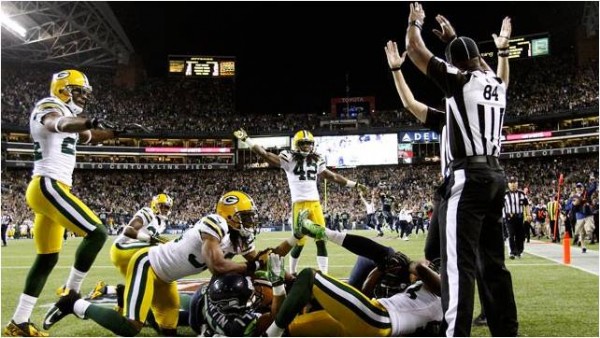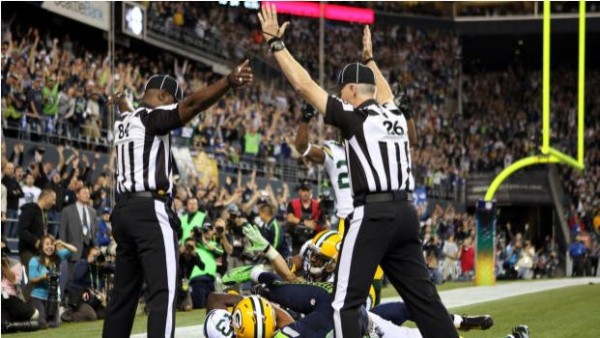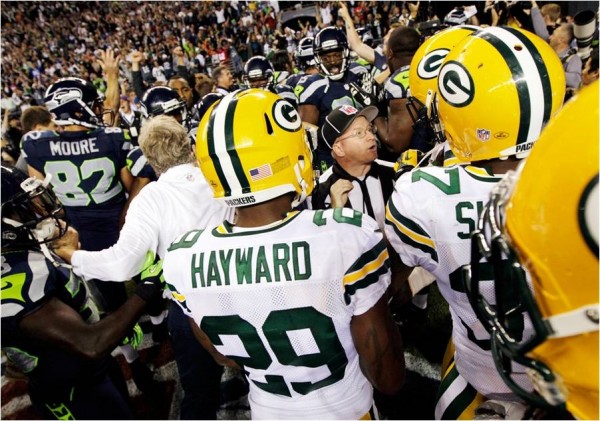Notes
Football’s End of Days?
When the National Football League (NFL) decided to lockout its officials after a summer-long contract dispute, Commissioner Roger Goodell committed to using “replacement” officials, insisting that the non-union and under-experienced officials would do “a very credible job.” What has happened since has been nothing short of apocalyptic, at least from the point of view of American sports media.
Even those who do not follow professional football likely know by now that the September 25 Monday Night Football game ended in controversy after the Seattle Seahawks scored the winning touchdown on what appeared to have been a Green Bay Packers interception on the last play of the game. Although replays showed that defensive back M.D. Jennings clearly maintained stronger possession, receiver Golden Tate got his hands on the ball enough to convince the replacement officials that he should get credit for the catch. Or, were they convinced?
The above image wonderfully captures the confusion of the game’s final play. Tate is barely visible as he and Jennings fight for the ball. The significance of the image, however, is with the officials who are making simultaneous, yet opposing, calls. The official in the foreground has his arms above his head as part of the signal to indicate a change of possession—i.e., an interception. Meanwhile, behind him the other official extends his arms upward in the instantly recognizable signal for a touchdown. The next image shows the same moment from a different angle.
The referee ultimately ruled the play a touchdown and, after a 10-minute delay and obvious chaos, the Seahawks had completed a 14-12 victory.
What transpired on the field in Seattle had been predicted by numerous observers of the NFL. As Grantland founder and writer Bill Simmons tweeted immediately after the game, “And . . . here’s the officiating apocalypse that was 3 weeks coming.” For anyone watching ESPN’s post-game coverage, following the social media traffic as the controversy unfolded, or reading the summaries online the following morning, his word choice probably seemed apt. Simmons himself had titled a September 21 column with a reference to “Referee Armageddon.” Yet others appeared ready to embrace the end-of-days tone. Monday Night Football analyst John Gruden called the referee’s decision “tragic” (of course, he also called it “comical,” so perhaps the confusion was affecting him, too), NFL.com writer Gregg Rosenthal announced that the “replacement official apocalypse arrived Monday night,” and countless columns and blog post used similar terms to describe the events.
There is perhaps no greater confirmation than the Green Bay-Seattle game that Americans’ obsession with sports, especially professional football, has taken on biblical proportions. Yet in a moment in American history when so many things might disrupt our faith—economic disparity and desperation, injustice against racial and ethnic minorities, women, and gays and lesbians, a corrosive political culture, etc.—it is the less-than-accurate resolution to a football game that provides a glimpse into our eschatological future.
According to Bluefin Labs, the Monday Night Football fiasco prompted 56,263 social media comments (Facebook and Twitter) per minute. For the sake of contrast, Mitt Romney’s acceptance speech at the Republican National Convention yielded 17,458 comments per minute, and Barack Obama’s acceptance speech at the Democratic National Convention yielded 52,988. These numbers may not tell us whether or not Americans think football is more important than the presidential election, but they do tell us something about what Americans think is important to talk about. The end of days, indeed.
— Michael Butterworth
(photos: AP/Seattle Times, John Lok; Getty Images/Otto Greule, Jr.; AP/Ted S. Warren)





Reactions
Comments Powered by Disqus